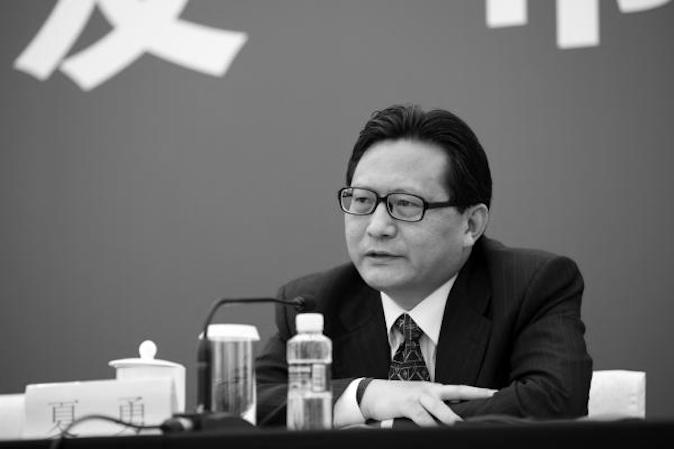The anti-corruption campaign of Chinese Communist Party leader Xi Jinping has swept through many Party organs, and officials responsible for overseeing legal matters and security in the regime have not escaped the dragnet.
On Sept. 1, Caixin, a respected mainland Chinese financial magazine, noted in a report that 11 of 12 former top officials in the Political and Legal Affairs Commission charged with corruption have been prosecuted. The Political and Legal Affairs Commission is an organization that oversees the courts, the prisons, and the police.
That day, the Party’s internal discipline agency also announced that Xia Yong, formerly the deputy director of the State Council’s Legal Affairs Office, was sacked for “serious disciplinary violations.” Earlier in July, state media announced that Xia was “no longer holding office.”
The official statements, however, made no mention of the role that the purged Party cadres played in what is probably the most serious human rights abuse in recent Chinese history—the persecution of Falun Gong.
When Jiang Zemin was Party leader in 1999, he ordered the suppression of Falun Gong, a traditional Chinese spiritual discipline practiced by over 70 million Chinese citizens, according to a state survey. The practice of Falun Gong involves teachings of truthfulness, compassion, and tolerance, and five sets of gentle exercises.
Scholars in China’s top academic body, the Chinese Academy of Social Sciences (CASS), were tapped in the early years of the persecution to produce literature to justify the persecution. Xia Yong, then a deputy director of the CASS’s Law Institute, was a member of one such anti-Falun Gong research group.
Xia has at least two articles critical of Falun Gong in his name, and they were carried by state mouthpiece media. The anti-Falun Gong academic subunit published over a hundred articles, and later released a book that accuses the practice of being an illegal cult.
But Falun Gong practitioners and Chinese human rights lawyers later found that the regime had no legal basis to persecute the practice. Since May 2015, over 200,000 practitioners and Chinese citizens have filed criminal complaints against Jiang Zemin for carrying out an unconstitutional suppression campaign, and for committing crimes against humanity.
“Xia Yong used his title and expertise as a law professor to intentionally twist the law to justify the persecution,” said Heng He, a China analyst and commentator. The articles Xia wrote “played an important role in demonizing and slandering Falun Gong and Falun Gong practitioners.”
Heng He added that the handiwork of Xia Yong and other scholars “continues to be used for brainwashing purposes in jails, labor camps, and brainwashing centers all over China.”
In 2000, Xia was also a founding executive council member of the China Anti-Cult Association, an organization linked with the regime that promotes anti-Falun Gong propaganda and offers detention facilities consultation for the forced conversion of practitioners.
Wang Zhiyuan, a spokesman for the World Organization to Investigate the Persecution of Falun Gong, said that members of the China Anti-Cult Association had came up with “theoretical research” that was later implemented in brainwashing sessions. The organization, Wang added, had played “an extremely negative role in the spiritual destruction and brainwashing of Falun Gong practitioners.”
Brainwashing, however, isn’t the most severe aspect of Jiang’s suppression campaign.
To date, over 4,000 Falun Gong practitioners have died from torture and abuse for refusing to renounce their belief, according to incomplete figures from Minghui.org, a clearinghouse for information about the persecution. Minghui believes the true number killed in this way is much higher but unknown at this time due to the difficulty of getting information out of China. At any one time, hundreds of thousands of others have been incarcerated in labor camps, brainwashing centers, or jail.
Researchers say the estimated 1.5 million organ transplants carried out by the Chinese regime in the last 16 years were sourced from prisoners of conscience, the majority of whom are Falun Gong practitioners. Ethan Gutmann, an American investigative journalist, likened organ harvesting to “slow motion genocide.”
Men like former security czar Zhou Yongkang, former Central Political and Legal Affairs Commission Secretary-General Zhou Benshun, and former Hebei security chief Zhang Yue oversaw the brutal aspects of the persecution. Interestingly, these chief persecutors and several others were named in the Caixin piece that mentions the 11 prosecuted top officials from the Party’s legal and security apparatus.
No Chinese officials has yet been removed for persecuting Falun Gong, although a pattern has certainly emerged over the last few years.




